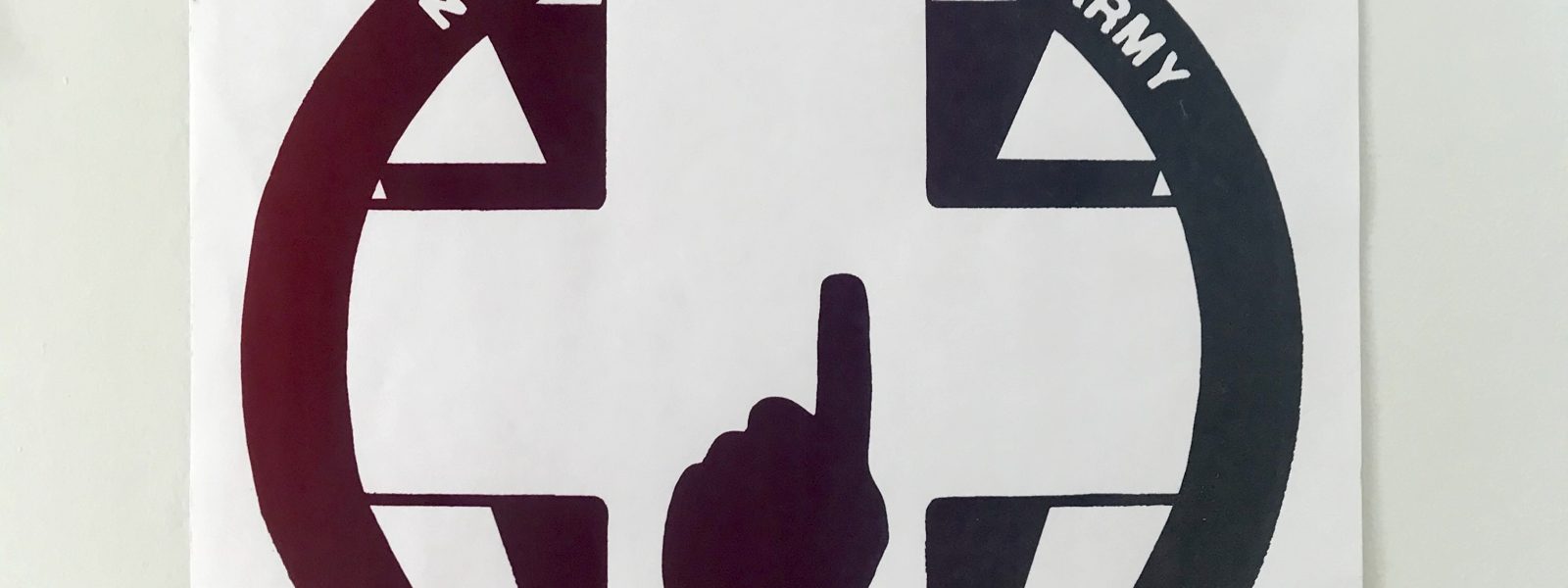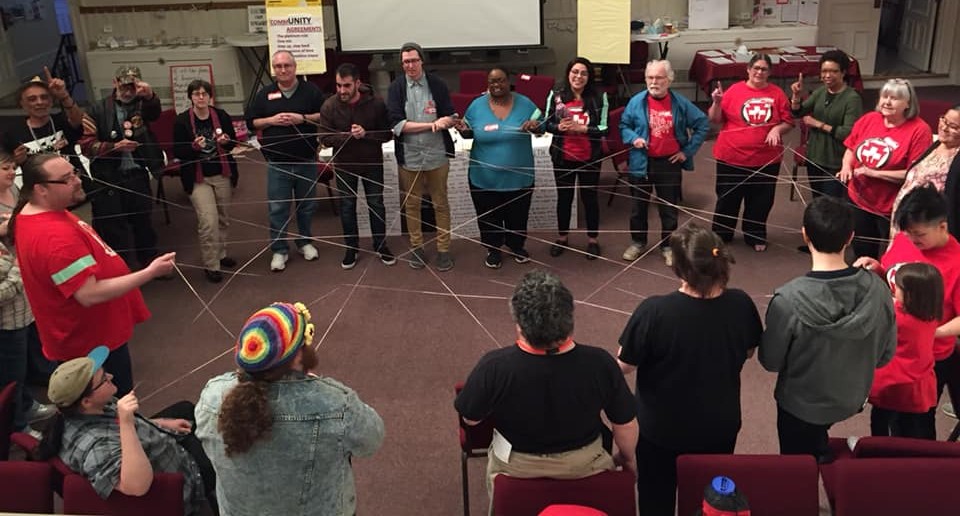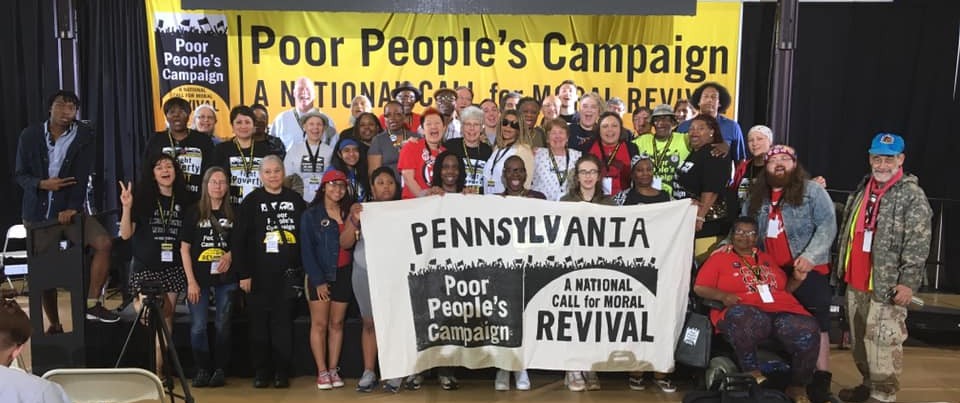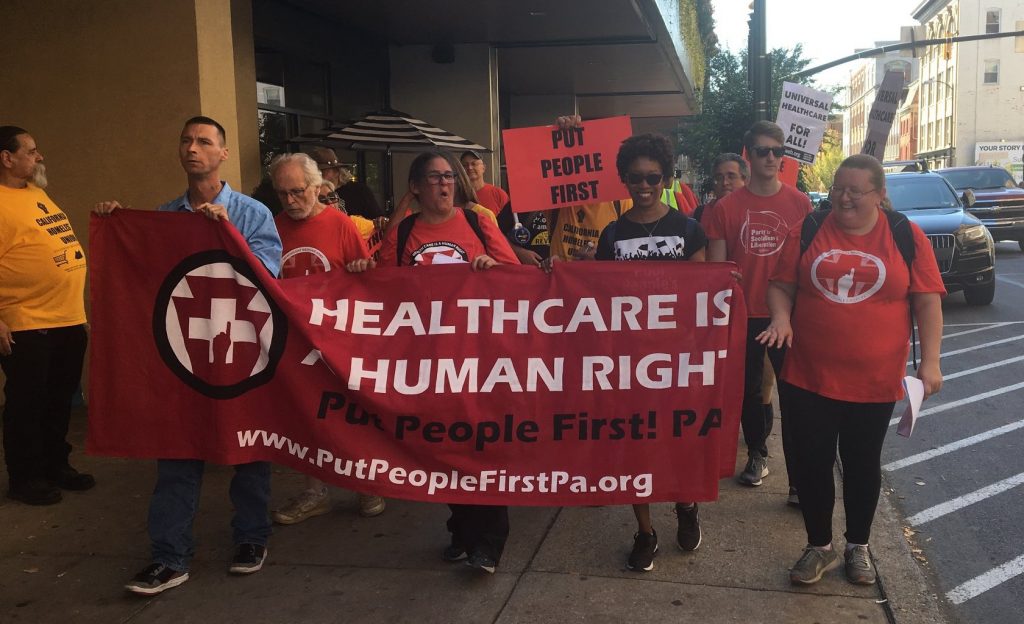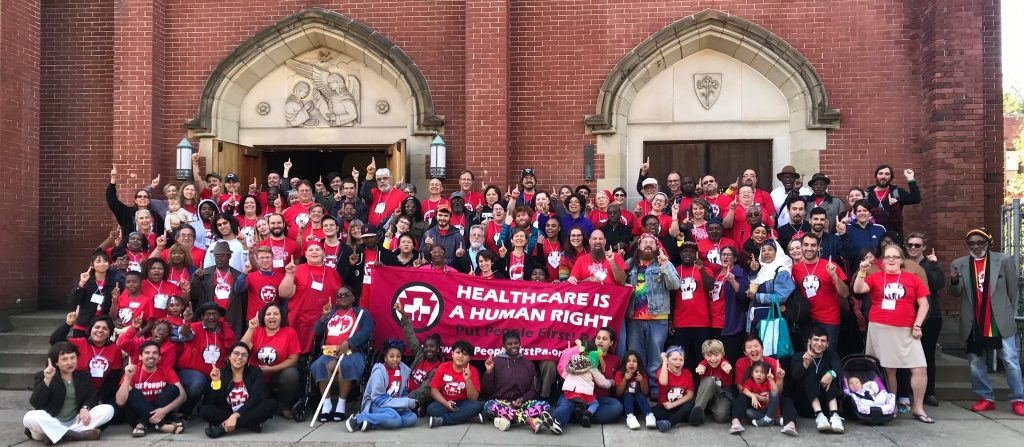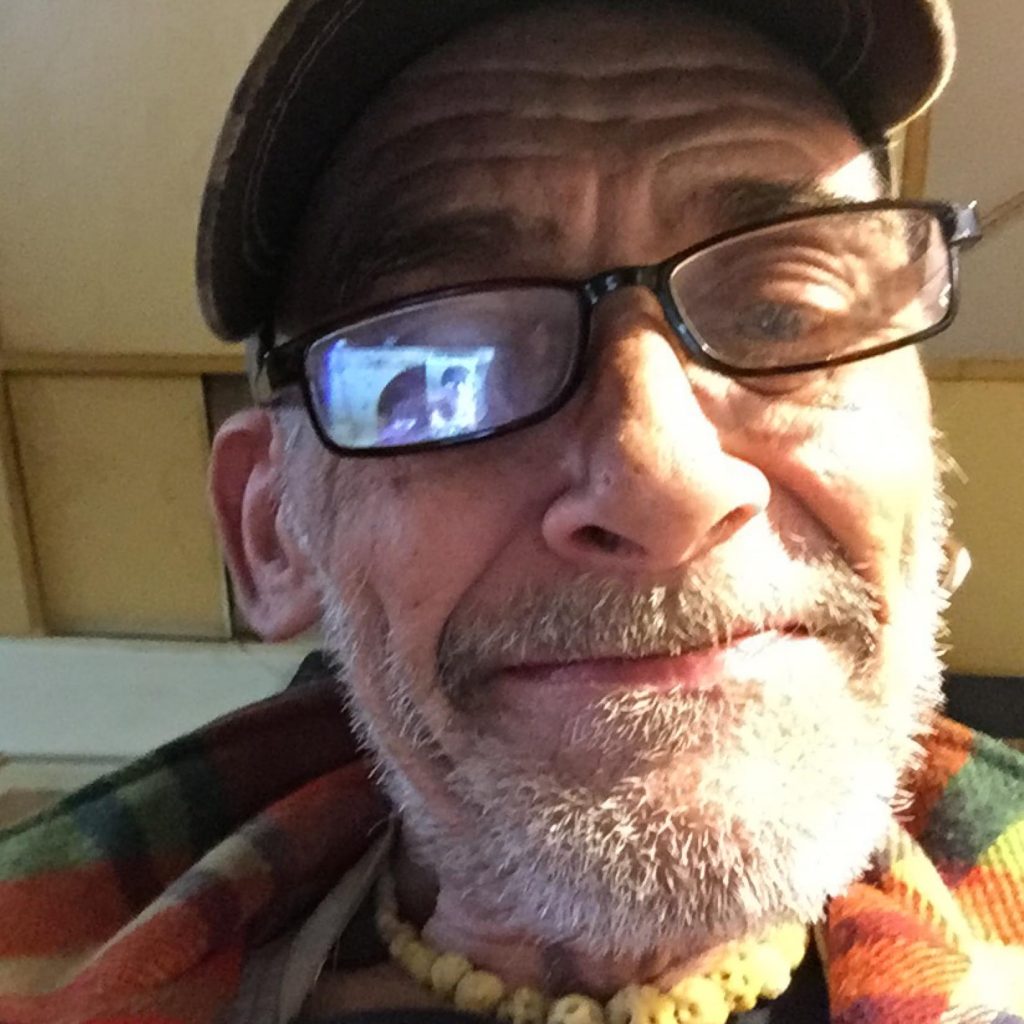I’m a laid off union worker, my healthcare is not guaranteed
by Amalia Kalisz Tonsor
How are you being affected by the pandemic? Below is a personal reflection from Amalia, a PPF-PA member living in Pittsburgh who was laid off in mid-March. In the past two weeks, 830,000 Pennsylvanians have abruptly found themselves without a job or income following the statewide shutdown of everything but “life-sustaining” businesses. As of last Friday, the number of new unemployment claims filed since the shutdown surpassed the total for all of 2019 (Inquirer.com 3/31/20).
PPF-PA believes our healthcare and our livelihood — shelter, food, water, education — can’t be tied to our ability to make a wage or not. These are human rights everyone deserves. For more information on how PPF-PA is responding during this crisis go to: www.putpeoplefirstpa.org/coronavirus .
I live in Pittsburgh and work as a union member in the entertainment industry. Our union works on a contract basis, meaning that if an entertainment producer wants to work in Pittsburgh, they must negotiate a contract with the union and then hire from our local talent pool. Before the COVID-19 pandemic emerged, I was hired on a production that planned to work in Pittsburgh through June or July. As I write this on March 16, the entire local crew of this production has been laid off indefinitely, without pay or continuity of benefits. During a wild time of unprecedented closures and work stoppages across our city, the country and the world, this disruption is felt in solidarity with millions of people whose livelihoods are impacted by the coronavirus outbreak, as well as those who were already struggling to get by in this unjust economy.
In the midst of a pandemic, when we most need assurance that health care will be available and affordable, our healthcare system continues to fail the vast majority of people. There have not been sufficient tests available even for those with comprehensive health insurance plans. Millions of poor and working people who are uninsured or underinsured have been laid off or told to stay home, without income to pay out of pocket for testing or emergency treatment, let alone to sustain the costs of preexisting health conditions or normal medical care. Undocumented people have been explicitly excluded from insurance programs and may already be afraid to seek medical care. People locked up in jails, prisons and detention centers are living at high risk of exposure without adequate health care. These conditions are compounding health risks to already vulnerable communities, and this virus is revealing the precarity of our healthcare system even for those like myself with insurance through our employers.
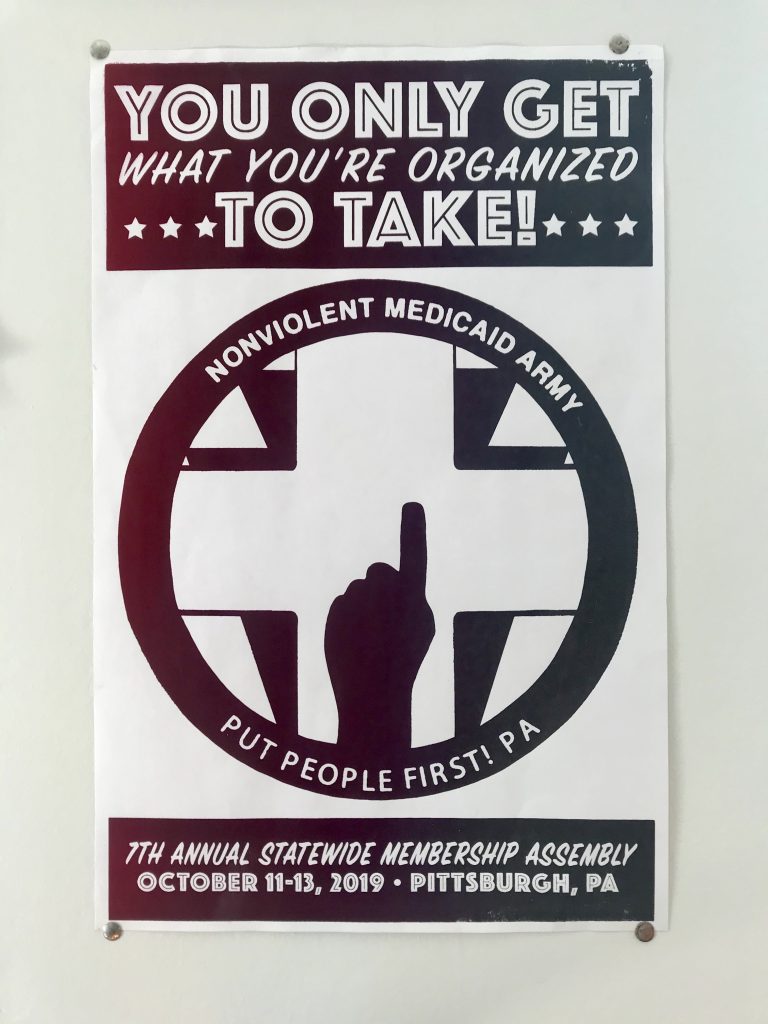
Union healthcare plans are often held up as proof that the status quo is working for working people. But what happens if we’re not working? In addition to lost income, these layoffs are impacting entertainment workers by cutting off employer contributions that would have subsidized our health insurance. Every union manages healthcare differently, but for us, our coverage is not guaranteed by our membership. It’s the production companies that hire us who are actually paying into our insurance coverage, so if they decide we are not working, both our livelihood and our healthcare is at stake. Here’s how my union healthcare works: The union has negotiated options with an insurance company so that members may enroll in select plans. The union sets up a health benefits account for each member, and productions that hire us then pay a certain amount into an individual’s account for each day they are employed on that production. That means if a member works enough days, they can accrue enough employer contributions to cover the cost of their insurance premium. Under this system, both our jobs and our healthcare are dependent on producers choosing to film in Pittsburgh, so there are huge tax incentives offered to coax the industry to come here. (While this makes our jobs possible and brings a lot of business to the Commonwealth, the producers also benefit greatly, as it costs much less to work here and they are subject to less regulation than in California or New York.) The individualized nature of a benefit based on counting a person’s “days worked” means that if for any reason I am not working for an extended period of time, there is no safety net for my insurance coverage. If I don’t get hired, or the state tax incentives have been used up for a while, or if we have all been laid off due to COVID-19 – then there are no employer contributions coming into my health benefits account. If there aren’t enough employer contributions, I am responsible to pay out of pocket for my premium of $502 per month, and I can only pay out of pocket without working for a certain period before losing coverage all-together. For perspective, the best coverage option costs $1,775 per month for an individual, and $3,919 per month for a family– that’s $47,028 for the year on a family plan.
I have only been working in the entertainment industry for a few years, and I am deeply grateful to the generations of workers who have taken great risks to make my job possible and to get us where we are. I am grateful for the health insurance I have, and for the folks in my union who are tirelessly available to help members advocate for their benefits. As I write this our union leaders are busting ass advocating for our members during this national emergency. This is not a critique of the union; it’s about the ways our options are limited under a system designed to profit corporate insurance companies. This is about how unions fit into the bigger picture of our dysfunctional healthcare system, and the ways that system penalizes working class people– even those of us who do make a living wage and can get lulled into thinking we’re doing fine. We are not guaranteed continuity of our healthcare benefits, while the productions that employ us are given tax breaks to work in PA, where our labor is comparatively cheap. Our union leadership is currently fighting to have entertainment workers recognized and included in the coronavirus relief packages that are being crafted in Congress. But why are we asking who is deserving of relief? The calls from all corners of society right now to be seen by the hands holding the purse strings is indicative of the enormous inequities in our society, and of the ways we allow ourselves to be divided. Whether or not this or that sector of the economy receives government support, the underlying denial of our human rights persists. In this disruption of the day to day, may we have a chance to see more clearly how we are connected. May the precarity we are experiencing in this moment help us to realize how vulnerable all working class people are – even those who consider themselves middle class – under a system that is held in place by keeping people sick and poor. May these circumstances lift up that another way is possible, that there are realistic alternatives to this system of disaster capitalism in which some individuals continue to profit off of the suffering of others. As we practice “social distancing” and stretch into bizarre new forms of collective care, may the strain on our social fabric be a felt reminder of how intricately we are held together. May we find creative ways to take care of each other, and may this instability shake us toward the necessity of universal healthcare.
